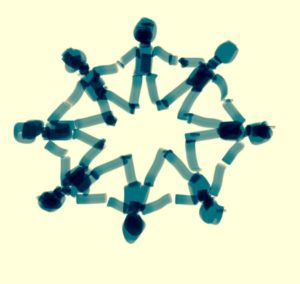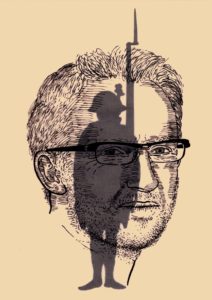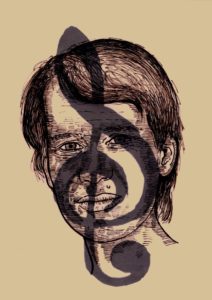Green Social Democracy Offers The Most Viable Path Toward A Sustainable Future
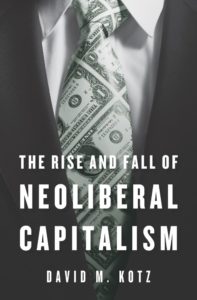 The coronavirus pandemic has created both a public health and an economic crisis in the United States. More than 300,000 people have died of COVID-19, with excess deaths highest among Black and Latinx populations. Hospitals across the country have passed the breaking point. And millions are struggling to eat and pay the rent. Yet, the stock market is hitting record highs and the super-rich are getting even richer in the midst of the pandemic. Yet, there is no talk among the elites of meaningful reforms, even while the climate change is driving the planet to tipping points.
The coronavirus pandemic has created both a public health and an economic crisis in the United States. More than 300,000 people have died of COVID-19, with excess deaths highest among Black and Latinx populations. Hospitals across the country have passed the breaking point. And millions are struggling to eat and pay the rent. Yet, the stock market is hitting record highs and the super-rich are getting even richer in the midst of the pandemic. Yet, there is no talk among the elites of meaningful reforms, even while the climate change is driving the planet to tipping points.
In the interview that follows, David Kotz, economics professor at the University of Massachusetts Amherst, argues that radical change is the only hope for a sustainable future and advocates a blueprint based on the vision of a “green social democracy.” Kotz is the author of scores of articles and books, including The Rise and Fall of Neoliberal Capitalism (Harvard University Press).
C.J. Polychroniou: David, we are again in the midst of yet another capitalist crisis, yet the stock market is at a record high. How could this be when the economy is weakening and so many Americans are struggling?
David Kotz: The performance of the stock market is not a good indicator of the health of the economy. It is driven by expected future profits of corporations and future dividend payouts, which cannot be known with any certainty. At times the stock market is affected by purely speculative factors; that is, the belief that if stock prices have been rising recently then they will continue to rise in the future, which can lead to a self-sustaining upward spiral in stock prices.
On March 1, 2020, just before the pandemic began to shut down the U.S. economy, the ratio of price to corporate earnings for the Standard and Poor’s 500 corporations was 22.80, yet after some nine months of pandemic economic crisis, it had risen to 37.08 on December 11, 2020. While the majority of the population has suffered financially during this period, the rich, who do most of the stock market investing, have been doing fine. Large corporations have been taking actions that boost their stock price, such as buying back their own shares at a historically high rate and making large dividend payouts — actions that do not indicate economic health of the economy. While U.S. corporate profits fell by 20 percent in the second quarter of 2020 compared to six months earlier, dividends fell by only 5 percent.
The United States is the richest country in the world, but its distribution of wealth is more unequal than in any other country in the advanced industrialized world. Why is that?
An unmodified capitalist economy generates a very high degree of inequality of income and wealth, as the owners of companies and other forms of property are able to take most of what is produced by working people. However, inequality can be reduced when workers have strong trade unions through which they can claim a larger share of what they produce. Inequality can also be reduced by several kinds of government interventions, including income maintenance programs, progressive tax systems, minimum wage regulations, provision of essential goods and services for free or at reduced cost, and not least, fiscal and monetary policies that promote a low rate of unemployment. A low unemployment rate increases labor’s bargaining power and particularly benefits workers who are at the low-wage end of the working class.
The labor movement in the U.S. historically has been weaker than in other developed capitalist countries. Among the reasons for this are the following: 1) the ethnic and racial diversity of the U.S. working class, which has made it more difficult for all workers to combine in struggle against employers; 2) the rapid population growth in the U.S. in the period when capitalism was developing in the late 19th and early 20th centuries, which created significant opportunity for workers and their children to rise in the class structure; 3) the U.S. capitalist class put up very determined resistance to labor unions, including the use of violence; and 4) American culture is relatively individualistic, which makes it more difficult for workers to engage in collective action.
For the same reasons cited above, the U.S. is the only developed capitalist country in which a working class-based socialist political party has never achieved major party status. In other countries such parties have played the major role in the enactment of government programs that reduce inequality. In the U.S., the Democratic Party has in some periods played a somewhat similar role, but that party is not a workers’ party but rather represents parts of big business and parts of small business as well as working people. The result has been much weaker government programs that reduce inequality.
Essay Essenties Forensische Expertise. Over het ideaal van een Handboek Forensische Expertise
Inleiding
Met dit essay [1] wil ik een onorthodox voorstel doen tot het vervaardigen van een handboek forensische expertise [2] . Mijn intentie is een echte begrip-verbetering te bewerkstelligen bij alle juridische professionals, bij alle ‘gebruikers van forensische expertise’ in de keten van het strafproces; mijns inziens een tijdloos en zeer nuttig ideaal.
Naar aanleiding van recente zitting-bezoeken aan 24 Nederlandse strafzaken waarin deskundigen een belangrijke rol speelden, is mij – in nagenoeg iedere strafzaak – gebleken dat meer begrip en duidelijker uitleg gewenst is van binnen het Nederlands Forensisch Instituut (NFI) gepraktiseerde natuurwetenschappelijk en technisch laboratoriumonderzoek, dat aan sporen wordt verricht, ten dienste van de waarheidsvinding in het strafrecht.
Dit sporenonderzoek in het kader van het strafproces wordt ook wel criminalistiek genoemd. Criminalistiek is het natuurwetenschappelijk deel van de forensische wetenschappen. Het richt zich op natuurwetenschappelijk onderzoek aan bewijsmateriaal ten behoeve van waarheidsvinding in het strafrecht. En het richt zich op de betekenis van de resultaten van zulk onderzoek voor die waarheidsvinding [3] .
De verklaring van een deskundige ter terechtzitting (art. 339, lid 1 sub 4) en het deskundigenrapport, de ‘schriftelijke bescheiden’ (art. 339, lid 1 sub 5) zijn de twee wettige bewijsmiddelen, die de deskundige regarderen ten aanzien van zijn bijdrage aan het bewijs. Samen met: eigen waarneming van de rechter, verklaringen van de verdachte en verklaringen van een getuige (art. 339, lid 1, sub 1, 2 en 3), zijn dit – limitatief – de vijf wettige bewijsmiddelen, die worden erkend in het Wetboek van Strafvordering.
Ondanks dat er in ons land ook forensische expertise wordt verricht door andere instanties, zoals de Politie, (semi) private instituten, – laboratoria en – personen en universiteiten, wil ik om twee redenen het NFI als mijn uitgangspunt nemen:
1. Anno 2020 wordt het leeuwendeel van gerechtelijke onderzoeken aan sporen in verband met strafbare feiten in Nederland nog immer – op hoog wetenschappelijk niveau – door het NFI verricht; in opdracht van het Openbaar Ministerie tijdens de opsporings- en vervolgingsfase, op verzoek van de rechter-commissaris, de rechter en in voorkomende gevallen ook ten dienste van de verdediging, op verzoek van de advocaat.
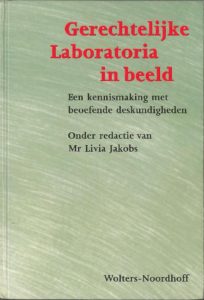
2. Anno 1995 heb ik het voorrecht gehad om een naslagboek [4] te mogen initiëren en redigeren over gepraktiseerde forensische expertise binnen de toen nog ‘’Gerechtelijke Laboratoria’’ genaamde voorgangers van het NFI.
Met betrekking tot de toen door mij onderscheiden 31 diverse deskundigheidsgebieden, is in solide samenwerking met 31 experts, destijds een krachtige kennisbron ontstaan ten dienste van de staande en de zittende magistratuur, wat tevens is aanbevolen als leerboek voor de Politie Academie.
Na 25 jaar acht ik de tijd rijp voor een actuele en gestructureerde herdefiniëring van voorwaarden ter beter begrip van de forensische deskundigheden, in de vorm van een:
Blauwdruk, die de essenties beschrijft van achtergrondkennis, theorie, praktijk en wetenschap, per expertise.
Ter illustratie van de importantie van een systematische samenstelling van een naslag- en leerboek over forensische expertise heb ik de volgende argumenten-vierdeling gemaakt:
A. Waarom: de redengeving, het vinden van redenen,
B. Wat: de inhoudsopgave, het versterken van bètawetenschappen en technieken,
C. Hoe: de methode, het beschrijven van de essentie in de verbindende Blauwdruk,
D. Waartoe: het verbeteren van het begrip van de doelgroepen.
Eutopia Institute of Ideas ~ On Middle East, Diversity & Democracy
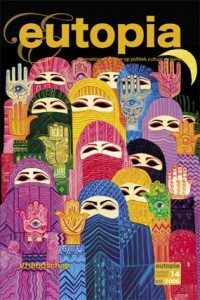 Developing and challenging new ideas on democracy, middle east, religion and transnational citizenship related to art and politics by multi-media works, (e-)print publishing and related e-magazines and by organizing public and professional meetings.
Developing and challenging new ideas on democracy, middle east, religion and transnational citizenship related to art and politics by multi-media works, (e-)print publishing and related e-magazines and by organizing public and professional meetings.
Eutopia concentrates on a variety of political and cultural issues, including the dialog between the Middle East and the West and developments linked to multiculturalism and the Muslim community in the Europe. Its global perspective is crucial.
For its activities Eutopia draws on an extensive network of freelancers, both at home and abroad, including philosophers, scientists, writers, journalists, artists etc. Eutopia’s good reputation is in fact partly based on its extensive network of contributors.
Eutopia is geared in particular – but not exclusively – towards dialog between North and South, as well as between Europe and the Islamic world. In addition, Eutopia aims to foster a concern for identity and intellectual development among young (migrant) individuals and to raise the quality of their input in European debates on social, cultural and political issues.
Eutopia concentrates on three core activities:
Eutopia E- Magazine: an international window on politics, culture and art.
Eutopia Live: lectures and workshops by and with artists and intellectuals; events and discussions about popular culture, film, literature and music.
Eutopia Academy: international exchange, conferences, networking and consultancy for cultural institutions.
Eutopia’s history and objectives
Eutopia, based in Amsterdam, was set up in 2002 by the sociologists Farhad Golyardi and Shervin Nekuee. Both Eutopia Magazine, of which so far twelve issues have appeared, and the Eutopia Live lectures and seminars have meanwhile found a niche of their own in Dutch cultural life. These activities are realized in collaboration with a great variety of local and nationwide institutions, including De Balie, De Unie, University of Amsterdam, Erasmus University Rotterdam, ISIM, Forum, Hivos, and the city of Amsterdam and the city of Rotterdam.
In general, Eutopia pursues closer collaboration with universities, governmental agencies and cultural institutions and foundations. Moreover, in the past few years, Eutopia has set up an extensive international network of scholars, authors, thinkers and artists in diaspora, many of whom are refugees. They provide major contributions to global intercultural dialogs and the formulation of new views about the dynamic of culture, identity and politics.
Eutopia aspires to develop into a more comprehensive interdisciplinary platform or institute that both nationally and internationally stimulates intercultural dialog in the areas of politics, science, culture and art. As such it fully follows in the prominent Dutch cultural tradition of politics and religious tolerance, which has spawned great thinkers such as Spinoza and Erasmus.
Eutopia is committed to promoting the debate on multicultural affairs in the Netherlands from a European and international perspective. What is the position of the Netherlands with respect to other European and immigration countries? Which social or cultural developments elsewhere have particular relevance for the Netherlands as an evolving multicultural society?
Go to: https://eutopiainstitute.org
David van Reybrouck – Revolusi. Indonesië en het ontstaan van de moderne wereld
In Nederland wordt een groot onderzoek gedaan naar het koloniale verleden*. Kolonialisme als oud zeer moet worden erkend, vindt ook David Van Reybrouck in zijn recent verschenen boek ‘Revolusi – Indonesië en het ontstaan van de moderne wereld’ waar hij vijf jaar intensief aan werkte. Het boek beslaat drie eeuwen, met veel aandacht voor de periode van de onafhankelijkheidsstrijd en dekolonisatie (1920-50).
Indonesië, het op drie na grootse land van de wereld, was het eerste dat na de Tweede Wereldoorlog, zijn onafhankelijkheid uitriep. Twee dagen na de Japanse capitulatie in augustus 1945 barstte een strijd los die meer was dan een conflict met de kolonisator Nederland. Op 17 augustus 1945 riep Soekarno de Onafhankelijkheid uit. Het was wereldgeschiedenis, het begin van de wereldwijde dekolonisatie. Pas in 1949 liet Nederland na veel strijd Indonesië gaan. Indonesië werd een voorbeeld voor andere koloniën, die in snel tempo ook onafhankelijk werden.
Tien jaar later organiseerde Soekarno, de eerste president van het land, de Asia-Afrika-conferentie van Bandung, het eerste mondiale congres zonder het Westen. Het werd een waterscheiding in de internationale politiek. In 1965 werd Soekarno afgezet en vervangen door de Soeharto. En kwam een einde aan de vrijheid in Indonesië. “Eigenlijk zijn we nooit onafhankelijk geworden’, concludeert Van Reybrouck.
In Revolusi verwerpt David Van Reybrouck het bekende nationale perspectief van de Indonesische vrijheidsstrijd. Bij de Indonesische onafhankelijkheidsstrijd waren meer partijen dan Nederland en Indonesië betrokken: Japan speelde een belangrijke rol met de bezetting van Indonesië, Groot-Brittannië, dat troepen stuurde, en de Verenigde Staten.
Naast het verrichten van research in archieven, interviewde hij vele plaatselijke jongeren waarmee de revolutie begon (inmiddels 90-plussers) die de grondslag legden voor een nieuwe wereld, de allerlaatste getuigen, die hij vond in Indonesische rusthuizen, op het platteland en op verafgelegen eilanden. Om de internationale dimensie te begrijpen, trok hij tevens naar Japanse miljoensteden, Nepalese bergdorpjes en Nederlandse buitenwijken.
De grote politieke ontwikkelingen verweeft Van Reybrouck met de vaak heftige herinneringen van hen die erbij waren. Zoals bij de in Nederland als Bersiap-periode bekende tijd, toen de Nederlandse troepen in 1945 terugkeerden en een golf van geweld begon. In Indonesië hoorde het geweld bij de omwenteling van de orde.
Hij laat honderden stemmen horen, die eerder niet werden gehoord.
Zo ontmoette hij Djajeng Pratomo, die in een rusthuis in Callantsoog zijn laatste jaren doorbrengt. Hij werd geboren in 1914, het jaar dat het koloniale rijk werd voltooid en als Indonesiër betrokken bij het verzet tegen nazi-Duitsland.
Een ander geïnterviewde geeft inzicht in het leven in ballingschap in Boven-Digul, Nieuw-Guinea, ver weg van Java en Sumatra. Deze onafhankelijkheidsstrijders werden onder vernederende omstandigheden geïnterneerd. ‘Nederland faciliteerde een soort Goelag voor ongewensten’, aldus Van Reybrouck.
Anderen getuigen over de verschrikkelijke honger en van Aziaten die in opdracht van Nederland met andere Aziaten moesten vechten. De oude mensen herinneren zich deze trauma’s nog steeds, hebben scherpe herinneringen aan deze periode.
In deze tastbare herinneringen schuilt zijn geschiedenis.
Het gaat over gewone mensen – in plaats van West-Europese mannen van een bepaalde leeftijd – die getuigen, en dat biedt een veelheid aan perspectieven en verhalen. Onderdrukkers en onderdrukten, Indonesische oud-strijders, bejaarde Gurkha’s, tot troostmeisjes.
Van Reybrouck schrijft de orale geschiedenissen op, zonder verwijten en dat maakt het des te indringender. Als er iemand verantwoordelijk is dan zijn dat de Nederlandse politieke leiders.
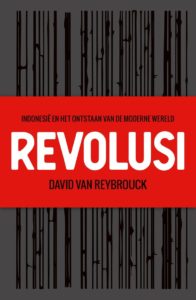 David Van Reybrouck hoopt dat het boek wordt gelezen, want licht werpen op de geschiedenis in de hoop dat ze erkend wordt, de pijn herkend wordt, kan een weg zijn naar genezing. En door deze pijn te herkennen biedt het boek hoop de hedendaagse problemen zoals het geweld dat we de planeet aan doen, op te lossen. Het boek functioneert als ‘achteruitkijkspiegel’.
David Van Reybrouck hoopt dat het boek wordt gelezen, want licht werpen op de geschiedenis in de hoop dat ze erkend wordt, de pijn herkend wordt, kan een weg zijn naar genezing. En door deze pijn te herkennen biedt het boek hoop de hedendaagse problemen zoals het geweld dat we de planeet aan doen, op te lossen. Het boek functioneert als ‘achteruitkijkspiegel’.
Van Reybrouck:
‘Mijmeren tijdens het kabbelen: zelfs als we met het kolonialisme uit het verleden ooit helemaal in het reine zijn gekomen, hebben we nog steeds niets gedaan aan de dramatische manier waarop we nu de toekomst koloniseren. De mensheid neemt de komende eeuw in met dezelfde meedogenloosheid waarmee in vroeger tijden werelddelen werden toegeëigend. Kolonialisme is niet langer iets territoriaals maar temporeels; het ergste ligt misschien niet achter ons, maar vóór ons. Wij gedragen ons als de kolonisatoren van de toekomstige generaties, wij ontnemen hun hun vrijheid, hun gezondheid, misschien zelfs hun leven.’
Indonesië en het ontstaan van de moderne wereld. De Bezige Bij, Amsterdam, 2020. ISBN 9789403183404
David van Reybrouck (1971) is cultuurhistoricus, archeoloog en schrijver. Zijn grootse succes was Congo. Een geschiedenis. In zijn essays Pleidooi voor populisme (2008) en Tegen verkiezingen (2013) pleit Van Reybrouck voor nieuwe vormen van democratie.
* zie: https://www.ind45-50.org)
Linda Bouws – St. Metropool Internationale Kunstprojecten
Noam Chomsky: Trump Has Revealed The Extreme Fragility Of American Democracy
Even after Trump-appointed bureaucrat Emily W. Murphy of the General Services Administration signed a letter enabling Biden to start working with federal agencies and prepare for a transition of power, Donald Trump has personally continued to resist conceding, thus breaking the tradition of a peaceful transition to power.
What is he after with his bogus legal challenges of a “rigged and stolen” election? Can he really hope for a legislative coup? Is the contemporary United States a country divided not merely on political and ideological issues among its body politic, but, more frighteningly, along different conceptions of reality? And will Trumpism continue after Trump has left office? Revered public intellectual Noam Chomsky sheds light on these questions with groundbreaking insights in this exclusive interview for Truthout.
C.J. Polychroniou: U.S. election officials have declared the 2020 election “the most secure in American history.” Yet, the Trump campaign continues to mount legal challenges to the electoral process, pushing outrageous falsehoods, while Rudy Giuliani has gone so far as to make outlandish claims of a vast global conspiracy to steal the election from the Great Leader. In your view, what is really behind Trump’s legal challenges?
Noam Chomsky: Speculation of course, but I’ll indulge in a bad dream — which could become reality if we are not on guard, and if we fail to recognize that elections should be a brief interlude in a life of engaged activism, not a time to go home and leave matters in the hands of the victors.
I suspect that Trump and associates regard their legal challenges as a success in what seems a plausible strategy: keep the pot boiling and keep the loyal base at fever pitch, furious about the “stolen” election and the efforts of the insidious elites and the “deep state” to remove their savior from office.
That strategy seems to be working well. According to recent polls, “Three-quarters (77%) of Trump backers say Biden’s win was due to fraud” and “The anger among Trump’s base is tied to a belief that the election was stolen.” Rejection of the legal challenges with ridicule may please liberal circles, but for the base, it may be simply more proof of the Trump thesis: the hated elites will stop at nothing in their machinations.
Meanwhile, this strategy requires keeping the wrecking ball — Trump’s symbol — actively at work. Do nothing to deal with the pandemic, even delay in providing data to Biden’s team while a top nurse’s union warns of “catastrophic death” in the growing chaos while “our hospitals are knowingly still not prepared” and the government is on vacation.
Viewed through the lens of this vile strategy, if the pandemic gets worse, so much the better. Then local officials will try to impose restrictions and even lockdowns to control patriotic Americans — in line with the plans of the supposed “Communist-run deep state” — leading to economic harm and intrusions on normal life. Meanwhile, Trump and his associates could abandon other normal governmental activities so that when Biden establishes what they describe as a “fake government” on inauguration day, the immediate problems will be severe and failure likely.
On that day, which will live in infamy among the faithful, Trump might set up what he claims is an authentic government in Mar-a-Lago, with Mitch McConnell’s Senate in his pocket and a furious popular base. The next step would be to make the country ungovernable, a specialty that McConnell has been perfecting for a decade and that an accomplished demagogue like Trump can manage reflexively. Everything that goes wrong can be blamed on the treacherous “elites.”
Trump and associates might, as some have speculated, set up an alternative media empire, incorporating talk radio and other far right outlets but perhaps not Fox, which has shown occasional signs of disobedience. Then they could come roaring back into power in 2022-2024, feeding on growing discontent.
They would then be free to destroy the environment with abandon and maximize short-term profit for their primary constituency, impose discipline on what remains of government, tame the media, institute harsh authoritarian measures elsewhere, and continue with their abject service to their masters — the real elites, the very rich and the corporate sector, the decision-makers, as recent academic research once again establishes very clearly.
It’s of no little interest that we have to turn to the world’s leading business journal, the very respectable London Financial Times, to read some elementary truths about what could once claim to be a leading democracy: “Anyone with a pulse,” Financial Times Associate Editor Rana Foroohar writes, “knows that in the US today the system is rigged in favour of the wealthy and powerful.” Foroohar adds:
One particularly illuminating paper [just cited] found that considering the opinions of anyone outside that top 10 per cent was a far less accurate predictor of what happened to government policy. The numbers showed that: ‘not only do ordinary citizens not have uniquely substantial power over policy decisions; they have little or no independent influence on policy at all’. We have had decades of legislative tweaks to everything from tax policy to corporate governance and accounting standards that have favoured capital over labour. Supreme Court decisions such as the Citizens United case have also dramatically increased the amount of money funneled into political campaigning. This has left the nature of America’s political economy perilously close to an oligopoly.
If the Trump strategy is anything like the speculation outlined above, the prevailing oligopoly might look like a fond memory.
Anger and contempt for “elites” is not a mistake, even if the real elites are effectively concealed by the propaganda machine.
Merlijn Twaalfhoven – Het is aan ons ~ Waarom we de kunstenaar in onszelf nodig hebben om de wereld te redden.
In zijn idealistische en bevlogen boek ‘Het is aan ons’ beschrijft Merlijn Twaalfhoven hoe iedereen kan bijdragen aan het oplossen van wereldproblemen. Hij stelt zich ten doel de wereld te redden en analyseert hoe het kunstenaarschap hierbij kan helpen: kunst kan houvast bieden in onzekere tijden. Twaalfhoven spreekt niet over een mooi afgerond kunstwerk – kunst moet open zijn – en iedereen moet eraan mee kunnen doen. Kunst is een speeltuin, een laboratorium voor nieuwe verbintenissen en onbevangen vragen. Het proces verloopt van Waarnemen, Voelen, Denken naar Maken. Het komt samen in een praktisch idealisme.
Twaalfhoven is op zoek naar ‘de verbinding van de nabijheid’.
Dat vereist een systeemverandering, een gezamenlijke toekomstvisie die op een waarachtige manier de menselijke waarden naar buiten brengt. Een praktisch, procesmatig idealisme.
Als componist en theatermaker organiseerde Merlijn Twaalfhoven wereldwijd voorstellingen. Hij ging de concertzaal uit en zette de muziek midden in de wereld. Als altviolist reisde hij in 1996 naar Bosnië, vlak nadat de vrede was getekend. Zijn concerten werden ‘unieke ontmoetingen’. De plaats waar werd gespeeld, werd van cruciaal belang. Hij zag wat muziek kan betekenen, al was het natuurlijk niet voldoende om een blijvende verandering tot stand te brengen. Met zijn werk voegt hij ‘een druppeltje toe aan een emmer die zich langzaam vult met vrede, moed, hoop, contact en gelijkwaardigheid’. Hij maakt ons deelgenoot van zijn reizen naar ook andere conflictgebieden waar kunst het verschil kan maken: zoals een Syrisch vluchtelingenkamp in Jordanië, de buitenwijken van Sarajevo, een huiskamerfestival in Jeruzalem, een oude pistolenfabriek in Zaandam, de Carnegie Hall in New York en een VN-conferentie in Alpbach, waar de kunstenaar werd uitgenodigd om te praten over de rol van kunst bij het halen van VN-doelen. De ontmoeting leidde helaas niet tot een concreet vervolg.
Het maken van kunst is vooral uitbesteed aan professionals, aldus Twaalfhoven. We lijken het vermogen te verliezen om zelf emoties, twijfels en dromen tastbaar te maken en vertraging te creëren. Maar schoonheid en verwondering verdienen een plek in ons leven.
Iedereen heeft een kunstenaar in zich, vrij vertaald naar Joseph Beuys. We hebben een ‘kunstenaarsmindset’ nodig, een speelse, onderzoekende, open en creatieve houding om bij te dragen aan een betere wereld. We hebben het allemaal in ons om krachten te bundelen, verhalen te vertellen, en iets van waarde te maken, tastbaar te maken wat in onszelf zit. Dan maken we het verschil.
‘Het is aan ons’, aldus Merlijn Twaalfhoven.
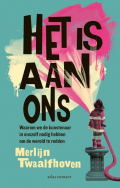 Hij sluit af met wat we kunnen leren van de kerk:
Hij sluit af met wat we kunnen leren van de kerk:
Ten eerste: markeer tijd en ruimte
Ten tweede: vind je houvast
Ten derde: spreek je idealen uit
Ten vierde: doe het samen
En ten slotte: vier je voortgang!
Atlas Contact, Amsterdam, 2020. ISBN9789045039800
Merlijn Twaalfhoven is componist en oprichter van The Turn Club, een samenwerkingsverband van kunstprofessionals, veranderaars en bruggenbouwers. Hij werkte o.a. met Het Nationale Ballet, Toneelgroep Amsterdam en het Kronos Quartet.
De bijeenkomst in Paradiso (d.d. 1 november 2020) naar aanleiding van het verschijnen van het boek ‘Het is aan ons. Waarom we de kunstenaar in onszelf nodig hebben om de wereld te redden.’:
Linda Bouws – St. Metropool Internationale Kunstprojecten
